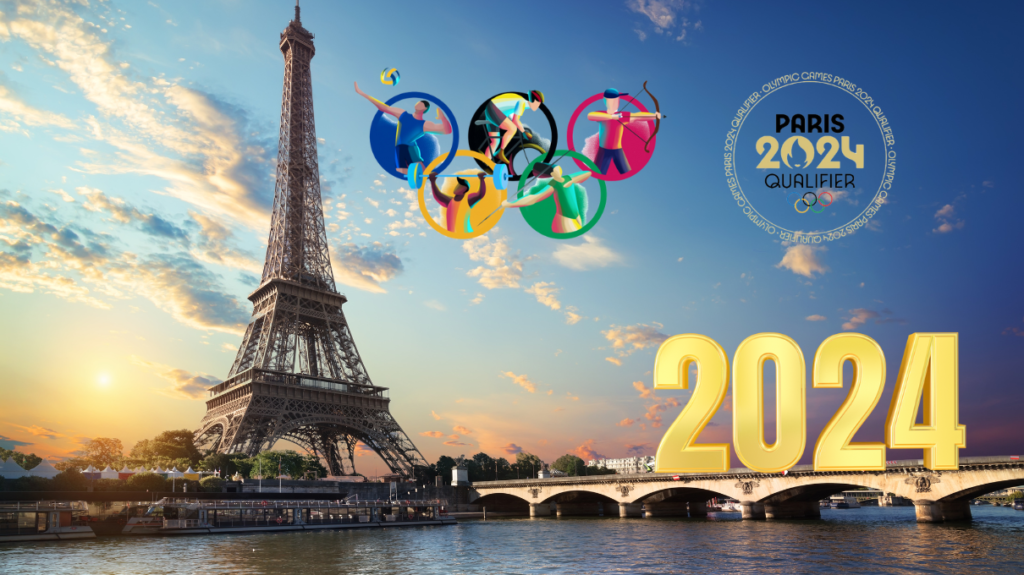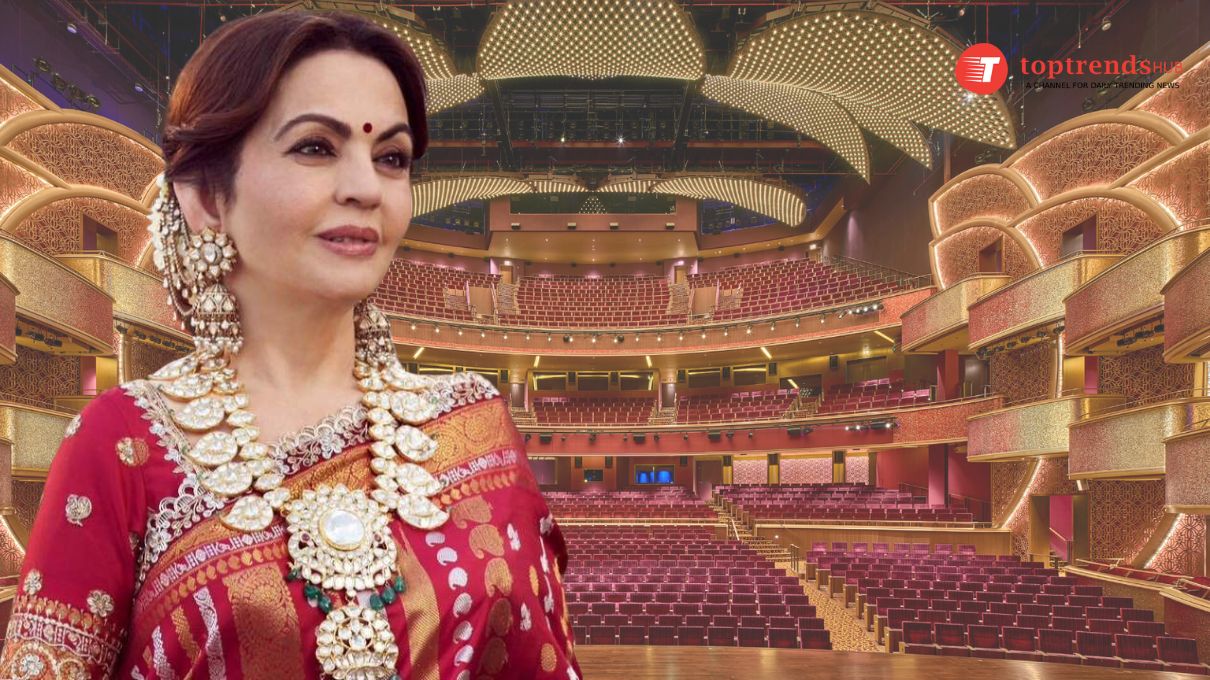The 2024 Summer Olympics, officially named the Games of the XXXIII Olympiad and branded as Paris 2024, are set to unfold from July 24 to August 11, 2024. The grand opening ceremony was held on July 26. Paris will be the main host city, with events also taking place in 16 other cities across Metropolitan France, and an additional venue in Tahiti, French Polynesia.
Paris won the bid to host the Olympics at the 131st International Olympic Committee (IOC) Session in Lima, Peru, on September 13, 2017. After several cities dropped out of the race, leaving Paris and Los Angeles as the final contenders, the IOC decided to award the 2024 and 2028 Olympics to both cities simultaneously. Both Paris and Los Angeles impressed the committee with their innovative plans to use a mix of existing and temporary venues. With the Games having previously been hosted in Paris in 1900 and 1924, this will be the third time Paris has hosted the Summer Olympics, making it only the second city to do so three times, after London.
Paris 2024 will celebrate the 100th anniversary of the 1924 Paris Games and the 1924 Chamonix Winter Games. This will be France’s sixth time hosting the Olympics (three Summer and three Winter), and the first since the 1992 Winter Games in Albertville. The Summer Olympics will return to their usual four-year schedule after the 2020 Games were postponed to 2021 due to the COVID-19 pandemic.
A highlight of Paris 2024 is the introduction of breakdancing as an Olympic sport. This will also be the final Olympic Games during Thomas Bach’s presidency of the IOC. The anticipated cost for the 2024 Games is around €9 billion.
Bidding Process
The bidding for the 2024 Olympics began with six cities in the running: Paris, Hamburg, Boston, Budapest, Rome, and Los Angeles. The process faced delays due to withdrawals, political issues, and high costs. Boston, having previously topped other U.S. cities, withdrew from the bid on July 27, 2015, due to mixed local opinions. Hamburg followed on November 29, 2015, after a local referendum. Rome withdrew on September 21, 2016, citing financial difficulties, and Budapest exited on February 22, 2017, after a successful petition for a referendum.
With these cities out of the running, the IOC Executive Board met in Lausanne, Switzerland, on June 9, 2017, to review the remaining bids. The IOC proposed choosing both the 2024 and 2028 host cities at the same time, a proposal that was approved in an Extraordinary IOC Session on July 11, 2017. Paris was then selected as the host city for 2024, with Los Angeles confirmed for 2028. This decision was officially ratified at the 131st IOC Session on September 13, 2017.

Host City Selection
Paris was chosen as the host city for the 2024 Summer Olympics on September 13, 2017, during the 131st IOC Session in Lima, Peru. Notably, the two French IOC members, Guy Drut and Tony Estanguet, were not eligible to vote due to Olympic Charter rules.
2024 Summer Olympics Bidding Results
| City | Nation | Votes |
|---|---|---|
| Paris | France | Selected as the host for 2024 |
| Los Angeles | United States | Chosen as the host for 2028 |
| Hamburg | Germany | Withdrew |
| Rome | Italy | Withdrew |
| Budapest | Hungary | Withdrew |
Development and Preparations
2024 Summer Olympics will be held in Paris and its surrounding areas, including nearby cities such as Saint-Denis, Le Bourget, Nanterre, Versailles, and Vaires-sur-Marne.
Venues for the 2024 Summer Olympics
Grand Paris Zone
| Venue | Events | Capacity | Status |
|---|---|---|---|
| Yves du Manoir Stadium | Field hockey | 15,000 | Renovated |
| Stade de France | Rugby sevens, Athletics, Closing ceremony | 77,083 | Existing |
| Paris La Défense Arena | Aquatics (swimming, water polo finals) | 15,220 | Existing |
| Porte de La Chapelle Arena | Badminton, Gymnastics (rhythmic) | 8,000 | Built for the Games |
| Paris Aquatic Centre | Aquatics (water polo preliminaries, diving, artistic swimming) | 5,000 | Existing |
| Le Bourget Climbing Venue | Sport climbing | 5,000 | Temporary |
| Arena Paris Nord | Boxing (preliminaries, quarter-finals), Modern pentathlon (fencing) | 6,000 | Existing |
Paris Centre Zone
| Venue | Events | Capacity | Status |
|---|---|---|---|
| Parc des Princes | Football (group stage, quarter-finals, gold medal matches) | 48,583 | Existing |
| Stade Roland Garros | Tennis, Boxing (finals) | 36,000 | Existing |
| Paris Expo Porte de Versailles | Volleyball, Table tennis, Handball (preliminaries), Weightlifting | 18,000 | Existing |
| Bercy Arena | Gymnastics (artistic and trampolining), Basketball (finals) | 15,000 | Existing |
| Grand Palais | Fencing, Taekwondo | 8,000 | Existing |
| Place de la Concorde | Basketball (3×3), Breaking, Skateboarding | 30,000 | Temporary |
| Hôtel de Ville | Athletics (marathon start) | 1,500 | Existing |
| Pont Alexandre III | Aquatics (marathon swimming), Triathlon, Cycling (time trial finish) | — | Temporary |
| Trocadéro (Pont d’Iéna) | Athletics (race walk), Cycling (road race) | 13,000 | Temporary |
| Eiffel Tower Stadium | Beach volleyball | 12,000 | Existing |
| Grand Palais Éphémère | Judo, Wrestling | 9,000 | Temporary |
| Les Invalides | Archery, Athletics (marathon finish), Cycling (time trial start) | 8,000 | Existing |
Versailles Zone
| Venue | Events | Capacity | Status |
|---|---|---|---|
| Gardens of the Palace of Versailles | Equestrian | 80,000 | Temporary |
| Le Golf National | Golf | 35,000 | Existing |
| Élancourt Hill | Cycling (mountain biking) | 25,000 | Existing |
| Vélodrome de Saint-Quentin-en-Yvelines | Cycling (track), BMX racing | 5,000 each | Existing |
Outlying Venues
| Venue | Events | Capacity | Status |
|---|---|---|---|
| Pierre Mauroy Stadium, Lille | Basketball (group stage), Handball (finals) | 26,000 | Existing |
| National Olympic Nautical Stadium of Île-de-France | Rowing, Canoeing (slalom, sprint) | 22,000 | Existing |
| Stade Vélodrome, Marseille | Football (6 group stage matches, quarter-finals, semi-finals) | 67,394 | Existing |
| Parc Olympique Lyonnais, Lyon | Football (6 group stage matches, quarter-finals, semi-finals) | 59,186 | Existing |
| Stade Matmut Atlantique, Bordeaux | Football (6 group stage matches, quarter-finals) | 42,115 | Existing |
| Stade Geoffroy-Guichard, Saint-Étienne | Football (6 group stage matches) | 41,965 | Existing |
| Allianz Riviera, Nice | Football (6 group stage matches) | 35,624 | Existing |
| Stade de la Beaujoire, Nantes | Football (6 group stage matches, quarter-finals) | 35,322 | Existing |
| Roucas Blanc Olympic Marina, Marseille | Sailing | 5,000 | Existing |
| Teahupo’o, Tahiti | Surfing | 5,000 | Existing |
| National Shooting Centre, Châteauroux | Shooting | 3,000 | Existing |
Non-Competitive Venues
| Venue | Events | Capacity | Status |
|---|---|---|---|
| Jardins du Trocadéro | Opening ceremony | 30,000 / 13,000 | Temporary |
| Champions Park, The Seine | Opening ceremony | 570,000 | Temporary |
| Olympic Village | Olympic Village | 18,000 athletes | Built for the Games |
| Aranui 5, Tahiti | Surfing Olympic Village | 256 athletes | Existing |
| Parc de l’Aire des Vents, Dugny | Media Village | — | Temporary |
| Le Bourget Exhibition Centre | International Broadcast Centre | 15,000 | Existing |
| Paris Congress Centre | Main Press Centre | — | — |
| Polygone de Vincennes | Road cycling training venue | — | Existing |
| Tuileries Garden | Olympic cauldron | — | Temporary |
Most of the Olympic events will be held in Paris and its surrounding areas, including nearby cities such as Saint-Denis, Le Bourget, Nanterre, Versailles, and Vaires-sur-Marne.
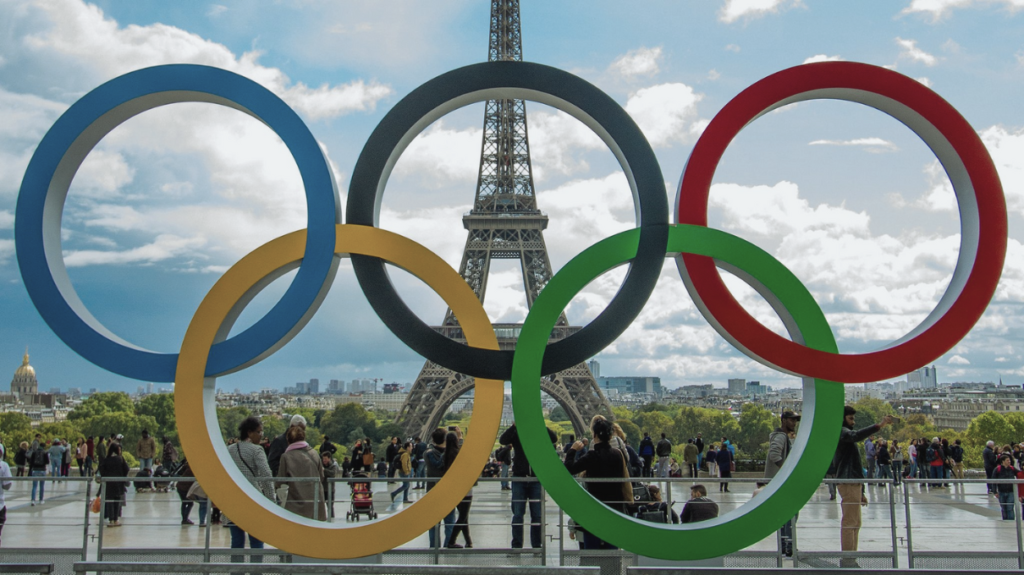
But the excitement won’t be confined to Paris alone. The basketball preliminaries and handball finals are set to take place in Lille, which is about 225 km (140 miles) from Paris. Sailing and some of the football matches will be held in Marseille, a beautiful Mediterranean city located 777 km (483 miles) from the French capital.
For surfing, athletes will travel to Teahupo’o, a village in French Polynesia, situated a staggering 15,716 km (9,765 miles) away from Paris. Additionally, football games will be hosted in five other cities: Bordeaux, Décines-Charpieu (Lyon), Nantes, Nice, and Saint-Étienne—several of which are renowned for their Ligue 1 football clubs.
Medals: A Glimpse of History The 2024 Summer Olympics
In February 2024, Tony Estanguet, the President of the Paris 2024 Olympic Organizing Committee, introduced the Olympic and Paralympic medals. These medals are distinguished by their unique design, featuring hexagon-shaped pieces of scrap iron from the original Eiffel Tower, with the Games’ logo elegantly engraved. Designed by Parisian luxury jeweler Chaumet, approximately 5,084 medals will be minted by Monnaie de Paris.
The reverse side of the medals showcases Nike, the Greek goddess of victory, set against the Panathenaic Stadium, which hosted the first modern Olympics in 1896. The Parthenon and Eiffel Tower also appear in the background. Each medal weighs between 455 and 529 grams, has an 85 mm diameter, and is 9.2 mm thick. The gold medals are composed of 98.8% silver and 1.13% gold, while the bronze medals consist of copper, zinc, and tin.
Ensuring Safety: Security Measures
To enhance security for the Games, France has partnered with Europol and the UK Home Office to facilitate information exchange and international law enforcement cooperation. Measures include deploying additional drones and sea barriers to prevent illegal crossings. The British Army will assist by providing Starstreak surface-to-air missile units for air security.
Parisian police have conducted extensive rehearsals and inspections, similar to their preparations for the 2023 Rugby World Cup. Agreements with Qatar will strengthen security further, with Polish security troops and sniffer dog handlers contributing. Additionally, police from over 40 countries will join French forces to maintain safety during the Games.
Security concerns led to adjustments in the opening ceremony plans, reducing expected attendance from 600,000 to 300,000 and limiting free viewing areas to invitation-only. Following threats from the Islamic State, French President Emmanuel Macron indicated that the ceremony could be scaled back or relocated if needed. About 75,000 police and military personnel will be deployed in Paris leading up to the Games.
Sustainable Dining: The Food Experience
In an effort to reduce environmental impact, the Paris 2024 Games will offer twice as many plant-based food options as previous Olympics. Vegan chicken nuggets and hot dogs will be featured, aiming to make 30% of the menu plant-based.
With an estimated 13 million meals to be served, including 1,200 Michelin-starred dishes daily, fresh baguettes and breads will be baked on-site. A 3,500-seat restaurant will highlight global cuisine, with special requests for porridge from Great Britain and kimchi from South Korea.
However, some athletes have reported food shortages and quality issues, leading them to seek dining options outside the Olympic Village. Teams like Great Britain’s have brought in their own chefs to address these concerns.
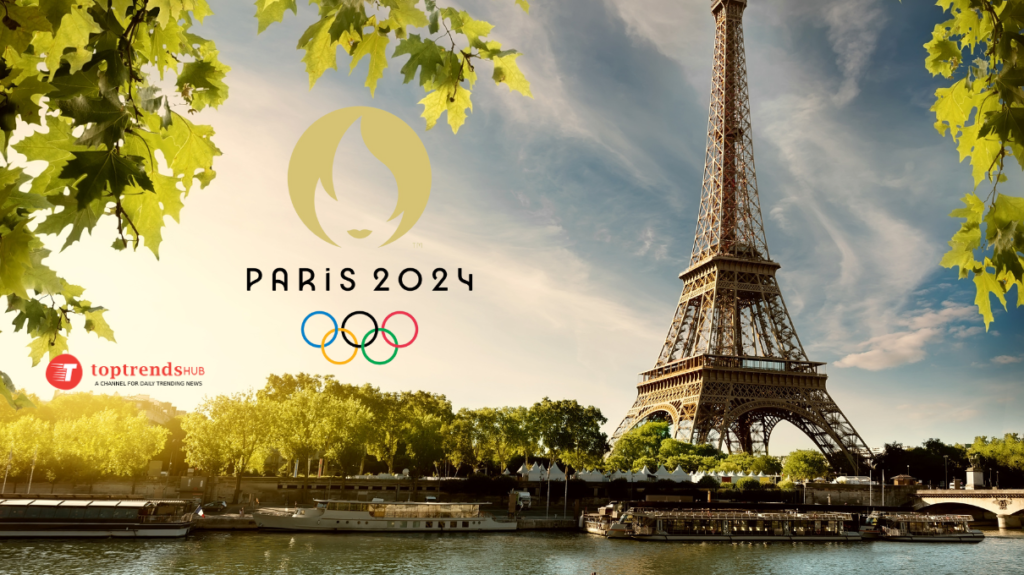
Cooling Challenges: Air Conditioning
In a move towards environmental sustainability, the Olympic Village will utilize a geothermal cooling system instead of traditional air conditioning, maintaining indoor temperatures about 6 °C cooler than outside. This decision prompted many teams, including Canada and Great Britain, to provide their own air conditioning units. Athletes from less affluent countries, such as Uganda, have expressed difficulty affording this additional comfort.
Transport Upgrades: Getting Around
Over €500 million has been invested in transportation improvements for the Games, including extending the Paris Métro and adding 60 kilometers of new cycle lanes. Public transport fares will increase to €4, supporting enhanced service frequency and extended hours. Reserved traffic lanes will ensure timely travel for athletes, officials, and the media.
Volunteers: A Global Effort
The Paris 2024 volunteer registration opened in March 2023, aiming to recruit 45,000 volunteers from around the world. By May 2023, over 300,000 applications were received, surpassing previous Olympics. Applicants were informed of their status between September and December 2023, with over 800 excluded due to security concerns.
Torch Relay: A Symbolic Journey
The Olympic torch relay began on April 16, 2024, in Olympia, Greece, with Greek rower Stefanos Douskos as the first torchbearer and French swimmer Laure Manaudou as the first French torchbearer. The relay will involve 10,000 torchbearers and visit over 400 locations in 65 French territories. However, unrest in New Caledonia led to the cancellation of that segment of the relay.
Opening Ceremony: A Historic Event
The opening ceremony, held on July 26, 2024, was directed by Thomas Jolly and marked a departure from traditional stadium settings. The athlete parade took place as a boat procession along the Seine, with cultural segments staged at various landmarks. The ceremony celebrated French history with a theme of love and shared humanity. Around 326,000 tickets were sold for Seine viewing locations, primarily for volunteers, youth, and low-income families.
The event featured performances by Lady Gaga, Aya Nakamura, Gojira, and Celine Dion, among others. President Emmanuel Macron officially opened the Games, with the Olympic cauldron, designed as a hot air balloon-inspired structure, lit by Teddy Riner and Marie-José Pérec. The cauldron’s flames are simulated by LEDs and aerosol jets.
A segment that appeared to parody the Last Supper stirred controversy, leading to an apology from the organizers.
Sporting Events: A Diverse Lineup
The 2024 Summer Olympics will feature 329 events across 32 sports, including 48 disciplines. This includes 28 core sports from previous Olympics and four optional sports proposed by the Paris Organizing Committee: breakdancing, skateboarding, sport climbing, and surfing. Four weightlifting events have been removed, and canoeing will see a shift from sprint to slalom events. Sport climbing events are now separated into speed climbing and boulder-and-lead events.
In early 2023, USA Boxing announced a boycott of the 2023 World Championships due to Russian and Belarusian participation, leading to support for the boycott from countries including Poland, Switzerland, and Canada.
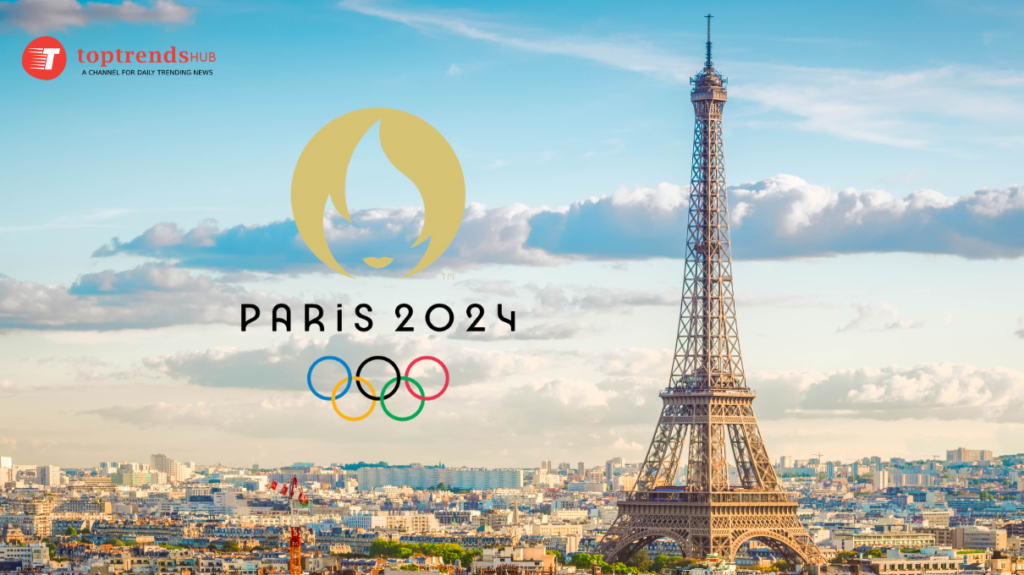
Aquatic Events
- Artistic Swimming: 2 events
- Diving: 8 events
- Marathon Swimming: 2 events
- Swimming: 35 events
- Water Polo: 2 events
Traditional Sports
- Archery: 5 events
- Athletics: 48 events
- Badminton: 5 events
- Basketball:
- Regular Basketball: 2 events
- 3×3 Basketball: 2 events
- Boxing: 13 events
- Breaking (Breakdance): 2 events
Water and Cycling Sports
- Canoeing:
- Slalom: 6 events
- Sprint: 10 events
- Cycling:
- BMX Freestyle: 2 events
- BMX Racing: 2 events
- Mountain Biking: 2 events
- Road Cycling: 4 events
- Track Cycling: 12 events
Equestrian to Gymnastics
- Equestrian:
- Dressage: 2 events
- Eventing: 2 events
- Jumping: 2 events
- Fencing: 12 events
- Field Hockey: 2 events
- Football (Soccer): 2 events
- Golf: 2 events
- Gymnastics:
- Artistic Gymnastics: 14 events
- Rhythmic Gymnastics: 2 events
- Trampoline: 2 events
Team and Combat Sports
- Handball: 2 events
- Judo: 15 events
- Modern Pentathlon: 2 events
- Rowing: 14 events
- Rugby Sevens: 2 events
- Sailing: 10 events
- Shooting: 15 events
- Skateboarding: 4 events
- Sport Climbing: 4 events
- Surfing: 2 events
- Table Tennis: 5 events
- Taekwondo: 8 events
- Tennis: 5 events
- Triathlon: 3 events
- Volleyball:
- Volleyball: 2 events
- Beach Volleyball: 2 events
- Weightlifting: 10 events
- Wrestling:
- Freestyle Wrestling: 12 events
- Greco-Roman Wrestling: 6 events
New and Optional Sports
When Paris was bidding for the Games in August 2017, the Paris Organising Committee proposed discussing the inclusion of esports with the IOC. However, by July 2018, it was confirmed that esports wouldn’t make it to the 2024 Olympics. Instead, at the 134th IOC Session in June 2019, the IOC approved the inclusion of new sports such as breaking (breakdance), alongside skateboarding, sport climbing, and surfing, which had their Olympic debut in 2020.
Closing Ceremony
The grand finale of the Games is set for August 11, 2024, at Stade de France. Named “Records,” the closing ceremony will feature over a hundred performers, including acrobats, dancers, and circus artists. Los Angeles, the city set to host the 2028 Summer Olympics, will offer a cultural presentation produced by Ben Winston and his studio Fulwell 73.
